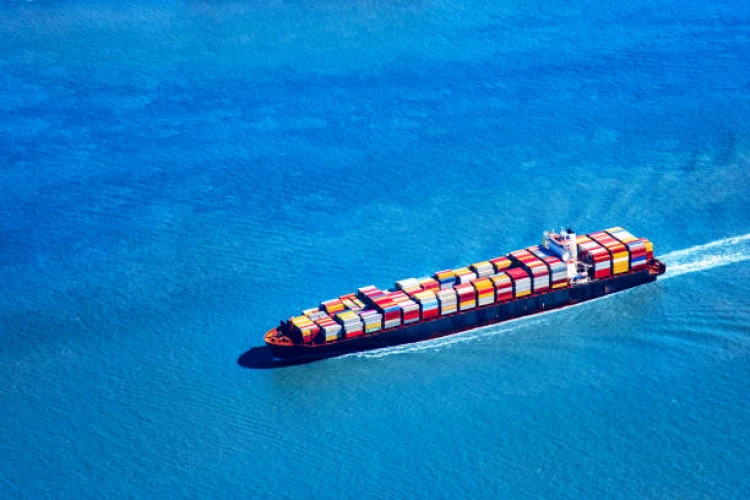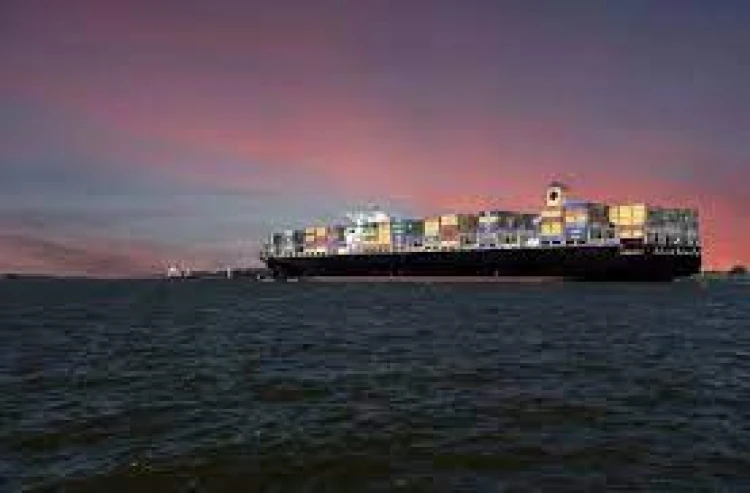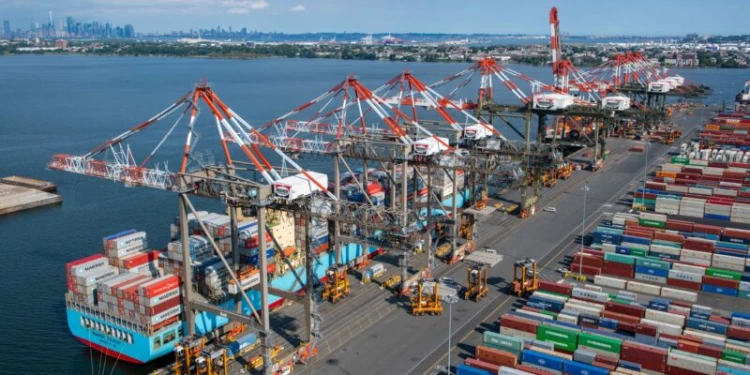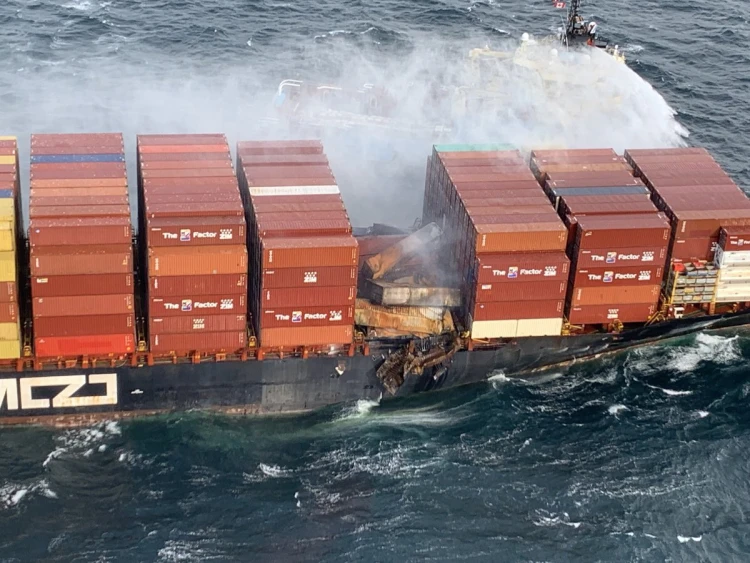French Navy Escorts CMA CGM Ships While US Ships Remain Stranded
Sunday, 14 July 2024

Operation Prosperity Guardian, the pivotal US-led mission to secure vital merchant shipping lanes through the Red Sea, is facing another critical setback. gCaptain’s recent reports highlight a troubling trend: a glaring absence of key allies, notably including AUKUS member Australia, in this international initiative. Compounding the situation, the French Navy, a cornerstone of the coalition, has withdrawn support, possibly temporarily, to focus on helping French-owned ships. This decisive move comes as US leadership faces mounting criticism among US shipowners for leaving American sailors dangerously exposed within range of Houthi forces, without adequate protection.
To be clear it is uncertain if the French withdrawal from Operation Prosperity Guardian is permanent or just a temporary shift of priorities to national interests.
gCaptain has received reports, confirmed by Dr. Sal Mercogliano, that the French Navy has shifted their focus away from US-led Operation Prosperity Guardian after a representative allegedly stormed out of the operation’s first meeting with US officials. The French have begun escorting their own cargo ships, including the containerships CMA CGM Pegasus, CMA CGM George Washington and APL Salalah, through the Red Sea. At the heart of this unfolding drama is a critical question: which ships deserve protection? While the French have shown a clear intent to prioritize their own shipping interests, the US approach has left its own American-flagged ships stranded in the region, that have been – some for a full week – waiting for escort.
It remains uncertain if France will withdraw from the coalition or if they will continue to help after prioritizing their ships but remain an operation member. One source close to the French Navy said that other European ship owners might get secondary priority after French-owned (but mostly foreign-flagged) ships.
This development marks a significant shift in the geopolitical dynamics of maritime security in one of the world’s most vital shipping lanes. The French decision underscores a growing crisis in shipping that puts national and regional priority ahead of global needs, while the US focuses on protecting all shipping – including ships owned by rivals like China – at the expense of the dwindling fleet of US-flagged merchant ships.
Operation Prosperity Guardian Trips On Day One
Defense Secretary Lloyd Austin’s announcement of Operation Prosperity Guardian, aimed at safeguarding the strategic Red Sea corridor under the Combined Maritime Forces in Bahrain, initially signaled a unifying effort. Led by the US Fifth Fleet and Task Force 153, the operation sought widespread participation. However, only ten nations joined, with allies like Canada and The Netherlands contributing merely a few staff officers. More notably, key naval allies such as Australia, Japan and South Korea abstained. Despite the Pentagon’s claims of ten additional silent partners, shipping experts remained skeptical about the efficacy of these covert contributors, particularly in actively protecting ships in such a high-stakes environment.
The strong announcement was, however, followed by confusion as shipping companies felt left in the dark saying that few practical details are known about the initiative launched on Tuesday by Washington or whether it will directly engage in the event of further armed attacks at sea.
gCaptain’s sources have revealed a pervasive sense of confusion, affecting not only European shipping executives but also US shipowners who have access to classified Pentagon briefings. In interviews conducted by gCaptain, sources within the US military highlighted a disjointed response to the crisis. While certain military elements, such as the US Transportation Command (TRANSCOM) and the Navy’s Naval Cooperation and Guidance for Shipping (NCAGS), have been actively engaging with ship owners, other segments of the military appear uncertain about the command structure of the operation. This lack of clarity over leadership roles is contributing to the overall confusion surrounding the initiative.
Other allies, focused on threats growing threats in the Pacific and South China Sea, fear Operation Prosperity Guardian, is a distraction from acute regional priorities. Japan and South Korea, regular contributors to previous counter-piracy U.S.-led forces in the region, are also notable by their absence from the current mission, despite the disruption to shipping also affecting Asian import-export routes.
US Flagged Ships Left Unprotected
The precarious situation of US-flagged ships stranded with military cargo near the Red Sea is at the center of this coalition angst. The French want to prioritize their ships while US-flagged ships – which the US Navy is obligated to defend – are inexplicably a lower priority for the US.
This urgent matter, highlighted by the recent rocket attack on a US-flagged tanker in Israel, starkly exposes the vulnerability of these vessels due to the alarming absence of adequate military protection. This critical situation not only threatens the safety of these ships but also raises profound questions about the United States’ resolve to safeguard its maritime assets, a commitment that seems to be wavering dangerously.
According to MarineTraffic.com, several US flag ships await escorts through the Red Sea right now. This is shocking considering that over 3,000 Marine Corps and Navy sailors were dispatched to defend foreign flag ships in the Persian Gulf early this year but no security detachments have been provided US flag ships stuck within Houthi missile range today.
The current scenario is exacerbated by a lack of attention from our leaders, especially Cabinet Secretary Pete Buttigieg, who has made no statement in support of US Merchant Mariners in his charge and appears to be fully detached from the Red Sea situation. It is a matter of utmost urgency that this situation is addressed with the seriousness it warrants.
White House Failures
It is clear from our sources that the US Navy, the naval experts, and the Department Of Transportation’s US Maritime Administration (MARAD), the shipping experts, are not running point on this operation, which is confusing. The question is, who is? None of our sources can answer this question for certain. The Secretary of Defense’s office has been the most vocal and certainly plays a part, but two top naval experts gCaptain interviewed believe the White House is possibly running point.
This is concerning because the handling of maritime affairs, particularly under Jake Sullivan’s team, lacks the shipping expertise needed to solve this problem. This stems from a strategic shift where the White House – with minimal involvement from specialized maritime bodies like the US Navy or MARAD, and international bodies like the International Maritime Organization – has taken a direct role in coalition-building efforts.
From the outset, the Biden administration’s approach to maritime affairs signaled a shift. The closure of the National Security Council’s maritime desk on day one left a noticeable gap in maritime expertise within the White House. Secretary Pete Buttigieg’s appointment to the Department of Transportation, perceived by some as a political move, and the assignment of a long-retired Admiral with a pre-appointment focus on climate resiliency and no shipping industry experience at MARAD, indicated a new direction in maritime policy.
This transition contrasts with the previous administration’s approach. Under Trump, there was a notable presence of maritime and naval experts in key positions with three former shipowners appointed to his cabinet. Despite many of their maritime initiatives faltering or being reversed as the administration began unraveling, they achieved notable successes, including the revitalization of the Philadelphia shipyard and the building of new training ships for maritime colleges.
Under President Biden, there appears to be a lack of maritime-specific knowledge among staff. Additionally, the appointment of a retired army general as Secretary of Defense, coupled with what some view as limited actions to bolster the Navy, points to a broader trend of maritime issues receiving less focus in the current administration’s defense and national security strategy.
Chaos And Confusion
It has been very difficult to get to the heart of this story because of the leadership failures, the classified nature of the naval discussion, and widespread confusion among allies and shipping industry leaders regarding Operation Prosperity Guardian.
Will France officially pull out and organize its own operation? Will Secretary Pete Buttigieg take charge? Will the White House reopen the National Security Council’s maritime desk? Will the US Navy fulfill promises to put marines aboard US-flagged ships and give them destroyer escorts? How long will it take to work out all these problems?
Many questions linger about the operation’s future. What stands out is the pressing need for a single, seasoned leader to oversee communication and coordination effectively. This role calls for a strong figure known to the shipping industry like to Admiral James Stavridis, who adeptly managed the response to Somali piracy, or Admiral Thad Allen, known for his coordination efforts during the Deepwater Horizon crisis. Exemplary leadership like theirs in would instill confidence and the importance of experienced guidance in resolving the current challenges effectively.
The leadership vacuum needs to be filled across the pond as well. If the operation continues under American leadership, it’s crucial for top executives of major shipping companies, such as Vincent Clerc of Maersk, to engage directly with key U.S. officials. Meetings in Washington D.C. with the Navy and Transportation Secretaries would be a pivotal move. Such collaboration would send a resounding message to mariners navigating the precarious waters under threat from Houthi drones. It would demonstrate a united front where the shipping industry, government authorities, and naval leadership are synchronizing their efforts to ensure safer seas. This is more than a strategic decision; it’s a necessary step to bolster confidence and security in these high-risk areas.
The ongoing chaos and confusion will persist until two critical steps are taken. Firstly, the current leadership void must be effectively addressed. Secondly, it is essential for the White House and Pentagon to stop micromanaging efforts without shipping industry expertise in-house. The expertise and insights of these professionals are indispensable for navigating the situation’s complexities. This collaborative approach – with one strong leader in charge whom both sides trust – will not only bring much-needed stability but could also pave the way for future collaboration.

06 January 2025
Hurricane Beryl trims cargo volumes in Houston and New Orleans

25 January 2025
Container freight rates tumble

08 February 2025

